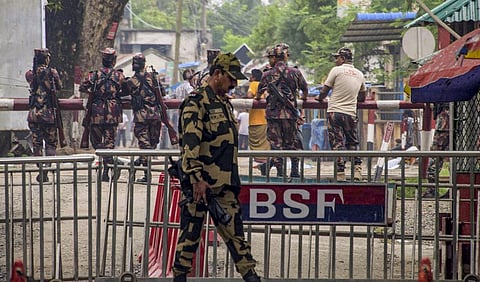

The most troubling signal that Bangladesh's note verbale to India on Monday demanding deposed Prime Minister Sheikh Hasina's extradition from Delhi to Dhaka sends out is that the relationship between the two countries is still in freefall.
This is very bad news for the health of India's security on its eastern front. In the past, the neighbouring country was sporadically used by terror elements to launch attacks on India, especially in the northeast, despite Sheikh Hasina's determination to stamp out such elements. Those days Bangladesh and Pakistan were not friends. But after August 5, when Sheikh Hasina fled to Delhi, this has changed. Dhaka’s warmth towards Islamabad has been there for all to see. And that has made India’s security concerns about the east a much bigger headache.
In just the last week, at least eight terror suspects with Bangladesh links have been arrested in Assam, Kerala and West Bengal. Most were identified as members of the banned Ansarullah Bangla Team or ABT, believed to be one of Al Qaeda's front organisations in Bangladesh. The ABT hit global headlines with the killing of bloggers in that country, including the US-based Avijit Roy while on a visit to Dhaka.
ABT was banned soon after by Bangladesh, with India, UK and the US following suit. Yet, these operatives were sent to recruit Indians and at least one of them in Murshidabad district in West Bengal went about the task by setting up an unauthorised madrasa which he funded and where he was teaching 30-40 students till his arrest. What is shocking is at least one of the three ABT operatives arrested in Murshidabad had his name in the voters list of two different Assembly constituencies in that district.
Even more alarming, one Javed Ahmed Munshi, 58, arrested at Canning, a district town not far from Kolkata, has been described by police as an operative of the terror outfit Tehreek-ul-Mujahideen whose declared agenda is to merge Jammu and Kashmir with Pakistan. Munshi, who has an Aadhaar card with a Srinagar address, was reportedly instructed by his Lashkar-e-Toiba (LeT) handlers to come all the way to West Bengal to reconnoitre a safe passage to Bangladesh across the vast riverine border between the two countries and make his way to Dhaka.
The apprehension in India's security circles is that Pakistan may use Bangladesh as a corridor to send arms to the northeast of India. Pakistani ships are now sailing into Bangladesh ports and the earlier orders to examine all cargo on these ships has been waived.
In Bangladesh, meanwhile, court decisions in the last one week have sent out equally alarming signals. Paresh Baruah, the chief of the United Liberation Front of Assam (ULFA), currently in self-exile possibly along the China-Myanmar border, was suddenly given a judicial reprieve. He had been sentenced to death for his involvement in the illegal shipment in 2004 of thousands of weapons to India via Bangladesh. The court revised Barua's death sentence in absentia to life imprisonment.
The courts also acquitted a minister in the government led by Bangladesh National Party (BNP), the chief political rival of Sheikh Hasina's Awami League, and five others who had been sentenced to death by a trial court in the sensational arms haul of Chittagong in April 2004. A big portion of the 4930 firearms, 840 rocket launchers, 300 rockets, 27,020 grenade launchers, 6,392 magazines and 11.41 million bullets seized from the ten trucks were suspected to be on their way to India’s northeast.
The red flags had gone up in August itself, soon after Sheikh Hasina’s dash to Delhi. On August 26, Jashimuddin Rahmani, chief of the banned ABT was given bail in the murder of blogger Rajib Haider in 2013, one of the terror group's earliest operations.
The big worry is what next? Already, a professor in Dhaka had made a bit of a local splash in September in some fringe media outlets with his oddball suggestion at a seminar that Bangladesh should strike a nuclear deal with Pakistan to seriously counter India. No saying who will take this brand of diplomacy forward.
The situation has certainly made the security apparatus in India take note and sit up.
As it did exactly 10 years ago when on October 2 a house blew up at Khagragarh in West Bengal's Burdwan district. Two people died on the spot but the incident led to the unearthing of a web of terror in the state and beyond run by JMB or Jamaat-ul-Mujahideen Bangladesh. This same outfit had in 2005 set off 500 explosions at 300 locations in 50 cities and towns across Bangladesh within a space of 30 minutes. It was reportedly also behind the worst-ever terror attack in Bangladesh at the Holy Artisan Bakery in Dhaka in 2016 in which 29 people were killed.
Many have argued that Sheikh Hasina had turned autocratic in the last few years and India, by giving her its full backing, had in a way supported her authoritarianism. But every country is driven by self-interest and the need for security on India's east from fundamentalist terror forces justified India's policy of backing Sheikh Hasina, come hell or high water.
Today, however, with ties between Dhaka and Delhi going downhill at the speed of light and Bangladesh becoming the playground of global geopolitics, India needs to hedge its bets and make the right moves so that the eastern neighbour doesn't become as challenging as the one to the west.
PS: India's border with Pakistan is 3323 km long approximately and the one with Bangladesh is 4096 km. That, according to some studies, makes the Indo-Bangla border the fifth longest land border in the world.